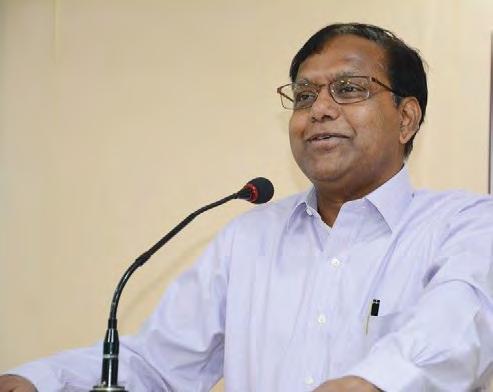
3 minute read
“Need to look at tax on coal”: M Nagaraju
Coal Insights Bureau
There is a need to look at taxation policies on coal to make domestic production competitive against imports, coal ministry additional secretary M Nagaraju said at the inaugural session.
Advertisement
“Both the central as well as state governments depend upon coal for revenues and is taxed at various stages by 45-49 percent. While costs of excavation is low, the costs of transportation plus GST, GST compensation cess, DMF (District Mineral Fund), NMET (National Mineral Exploration Trust) all those together push up cost of coal so imported coal continues to be competitive, and sometimes cheaper than domestic coal. So we need to take a relook at taxation policy,” he said.
There is also need to take a relook at cost of coal transportation by Railways which gets 48 percent of its revenues from coal, he said.
Impact of Railways tariff
“Tariff on coal transportation is one of the highest in the world. Railways shouldn’t look at coal as its major revenue earning source but as something through which they can contribute to the development of the country by providing coal at a cheaper rate to consumers,” Nagaraju commented while delivering the keynote address.
Levies on coal including royalty, contributions to NMET, DMF, GST of 5 percent and GST compensation cess of `400 per ton raises the price of G8 grade coal (5,000 kcal/kg) by about 46 percent. The tax burden on the higher grades of domestic coal touches 60 percent in some cases.
In comparison, duties and taxes on same grade of imported coal from Indonesia is about 15 percent.
“While statutory levies on medium grade (5,000 kcal/kg) coal imported from Indonesia is 15 percent of CIF, it is as high as 46 percent for equivalent coal of G8 grade,” Tiwary said.
For lower grade coal (4,200 kcal/kg), the statutory levies on coal is 20 percent of CIF while it is 55 percent on the price of domestic coal.
For G14 grade of domestic coal, the statutory levies are still high at 62 percent of price of coal.
GST compensation cess is levied at a flat rate of `400/te on both domestic as well as imported coal irrespective of the grade of coal that is supplied.
There are also charges on transportation and evacuation of coal. Railways typically have dynamic pricing for peak and nonpeak seasons and busy and non-busy routes besides development surcharges on railway freight.
Recent freights concessions offered by the Railways for coal has negligible impact on landed cost of domestic coal as only about 8 percent of the total commitment of Coal India for the power houses resides beyond 1,400 kilometer.
Request for tariff reduction
Coal India has asked Railway Board for rationalisation of tariff slabs similar to that of iron ore so that overall landed costs of domestic coal comes down.
Additionally, it has asked coastal power plants to give a proposal to the Railways and to the ports to provide structured reduction in freights so that domestic coal can reach coastal plants through the Rail-Sea-Road route at prices cheaper than imported coal.
Following such initiatives, coal plants of AP Genco are going for lesser coal imports, S N Tiwary, Director (Marketing), Coal India said.
There is also a need to make evacuation efficient and faster so that the ultimate consumer pays less, Nagaraju said.







